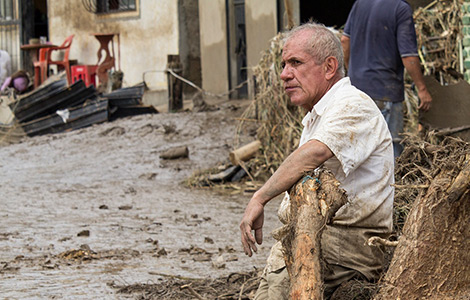Temporary accommodation
This FAQ covers temporary accomodation options in the case of an extreme weather event or natural disaster. It covers options for homeowners, renters and unhoused people.
Temporary accommodation cover: if you own your home and have insurance
If your home has been damaged and you have insurance, your policy may provide cover for the costs of temporary accommodation.
The details will depend on the wording of your policy, but this usually means your insurer will pay the reasonable costs of alternative accommodation for you and the other usual residents of your home. This is usually up to a maximum amount or for a maximum length of time.
Temporary accommodation cover could also include things like packing, removal and storage of your household items.
Different policies will have different cover, so it’s important to check the wording of your policy to understand exactly what you’re entitled to.
How much cover can I get?
Your cover depends on the terms of your insurance policy. You could be entitled to:
- a maximum dollar amount (for example, $25,000), or a time amount (for example, 6 months), or if your policy includes both, whichever maximum you hit first; or
- a percentage of the value of the policy (for example, % of contents cover).
How do I find out what I am entitled to?
Temporary accommodation cover is usually provided under either your building or contents insurance policy.
If you don’t have a copy of your insurance policy, you can request it from your insurer.
When is temporary accommodation cover triggered?
Your policy will set out the situations where temporary accommodation cover is available.
Common “triggers” for temporary accommodation cover can include:
- physical damage to your home caused by an “insured event” (as defined in the policy) which makes it uninhabitable
- your home becoming uninhabitable because of a loss of services such as power and sewerage
- you not being able to live at your home because it has been red stickered or because Civil Defence have closed access roads.
Temporary accommodation is usually not provided just because it is difficult to access your home, or you feel unsafe.
How is temporary accommodation cover paid?
You should contact your insurer before agreeing to pay for temporary accommodation. Typically, they will pay the cost of temporary accommodation directly to the accommodation provider, rather than reimbursing you for the cost.
Temporary accommodation cover usually provides you with accommodation that is an equivalent standard to your home.
What kind of accommodation is covered?
Your policy will set out the kind of accommodation that is covered. Some insurers limit temporary accommodation cover to rental properties, hotels and motels. Other insurers may cover things like the purchase of a caravan or cabin, or paying friends and family for short-term board. If payments are made to your family members, they may have reporting obligations to Work and Income.
If you own a holiday home that you normally rent out, and are using it as temporary accommodation, some insurers may still pay you a temporary accommodation allowance. You’ll have to show that you’re losing out on the rental income of the holiday home because you’re using it as temporary accommodation for yourself. You won’t be able to claim this if you’re already claiming for lost rent under your landlord insurance policy, though, so it’s worth checking which policy would give you a better deal.
When will temporary accommodation allowance cover end?
Your cover will end when you have used up your allowance under your insurance policy or you can return to your home again, whichever comes first.
Emergency housing: if you’re renting or homeless
Following an emergency or extreme weather event, there are temporary and emergency accommodation options available for people outside of insurance policies, too. If you’re renting or homeless, you may be able to access event-specific temporary housing, or emergency support through WINZ.
The house I rent is unliveable after an extreme weather event, where can I get support?
you need Following an emergency or extreme weather event, emergency accommodation should be available through the MBIE Temporary Accommodation Service (TAS).
How do I register for Temporary Accommodation Service?
If you need temporary accommodation following an extreme weather event or disaster, you can register your details with TAS online at: tas.mbie.govt.nz, or by calling 0508 754 163. They should get back to you within two days to organise accommodation.
I need urgent housing after an extreme weather event, where can I get support?
If you’ve registered for TAS after an extreme weather event but need somewhere to stay in the meantime, you should visit your nearest Civil Defence Centre. Go to: civildefence.govt.nz/find-your-civil-defence-group.
What other emergency accommodation options are available?
WINZ may pay for emergency accommodation if you have nowhere to stay and can’t afford to pay for short-term accommodation yourself. To qualify, you’ll need to show that you have nowhere to stay for tonight or in the next seven days. You’ll also need to show that you’re a New Zealand citizen or permanent resident who ordinarily lives here.
If you qualify for emergency housing, you could stay somewhere like a boarding house, backpackers, or motel. For more information about accessing WINZ emergency accommodation, go to: workandincome.govt.nz/housing/nowhere-to-stay.

